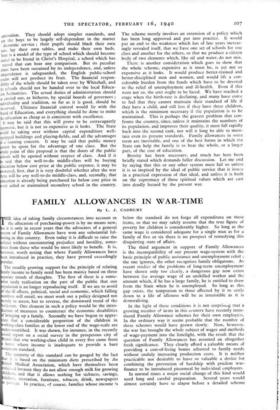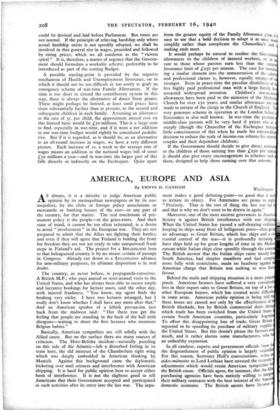FAMILY ALLOWANCES IN WAR-TIME
By L. J. CADBURY
HE idea of taking family circumstances into account in the allocation of purchasing-power is by no means new, ut it is only in recent years that the advocates of a general tern of Family Allowances have won any substantial fol- wing in this country. Even today it is difficult to raise the bject without encountering prejudice and hostility, some- tnes from those who would be most likely to benefit. It is, 'Never, worth noting that where Family Allowances have .en introduced in practice, they have proved exceedingly pular.
The steadily growing support for the principle of relating mily income to family need has been mainly based on three parate trends of thoughts. The first of these is a some- hat tardy realisation on the part of the public that our pulation is no longer reproducing itself. If we are to avoid 1 the ill effects, political, social and economic, which falling umbers will entail, we must work out a policy designed not rely to arrest, but to reverse, the downward trend of the nth-rate. One element in such a policy would be the intro- uction of measures to counteract the economic disabilities f bringing up a family. Secondly we have begun to appre- ate that a considerable proportion of the children in orking-class families at the lower end of the wage-scale are nder-nourished. It was shown, for instance, in the recently sued report on a social survey in the prosperous city of ristol that one working-class child in every five came from home where income is inadequate to provide a bare nimum standard.
The austerity of this standard can be gauged by the fact at it is based on the minimum diets prescribed by the ritish Medical Association, which have themselves been itici3:d because they do not allow enough milk for growing 'Idren, and that it allows nothing for sickness, savings, olidays, recreation, furniture, tobacco, drink, newspapers postage. In practice, of course, families whose income is below the standard do not forgo all expenditure on these items, so that we may safely assume that the true figure of poverty for children is considerably higher. So long as the same wage is considered adequate for a single man as for a family of five or six there is no prospect of remedying this disquieting state of affairs.
The third argument in support of Family Allowances is the incompatibility of our present wage-system with the basic principle of public assistance and unemployment relief ; the one ignores, the other recognises family obligations. As recent studies of the problems of long-term unemployment have shown only too clearly, a dangerous gap now exists between the average wage of an unskilled worker and the amount which, if he has a large family, he is entitled to draw from the State when he is unemployed. So long as this gap exists, the temptation to those affected by it to settle down to a life of idleness will be as irresistible as it is demoralising.
In the light of these conditions it is not surprishig that a growing number of firms in this country have recently intro- duced Family Allowance schemes for their own employees. In the ordinary way it seems probable that the number of these schemes would have grown slowly. Now however, the war has brought the whole subject of wages and methods of wage-payment into the limelight, with the result that the question of Family Allowances has assumed an altogether fresh significance. They clearly afford a yaluable means of providing a cost-of-living bonus adjusted to family needs without unduly increasing production costs. It is neither practicable nor desirable to leave so valuable a device for combining the prevention of hardship with prudent war- finance to be introduced piecemeal by individual employers.
In normal times a major social change of this kind would need long and careful preparation. Several years would almost certainly have to elapse before a detailed scheme could be devised and laid before Parliament. But times are not normal. If the principle of relieving hardship only where actual hardship exists is not speedily adopted, we shall be involved in that general rise in wages, preceded and followed by rising prices, which we all condemn as the " vicious spiral." It is, therefore, a matter of urgency that the Govern- ment should formulate a workable scheme, preferably to be introduced as part of the coming Budget.
A possible starting-point is provided by the triparite mechanism of Health and Unemployment Insurance, on to which it should not be too difficult or too costly to graft an emergency scheme of war-time Family Allowances. If the time is too short to extend the contributory system in this way, there is always the alternative of direct State grants. These might perhaps be limited, at least until prices have risen substantially further than at present, to the second and subsequent children in each family. Assuming an allowance at the rate of 5s. per child, the approximate annual cost on this limited basis would be Lso millions. This is a large sum to find, especially in war-time, and if it were a net addition to our war-time budget would rightly be considered prohibi- tive. But if it is regarded, as it should be, as an alternative to an all-round increase in wages, we have a very different picture. Each increase of Is. a week to the average rate of wages means an addition to the national wages bill of some £50 millions a year—and in war-time the larger part of this falls directly or indirectly on the Exchequer. Quite apart from the greater equity of the Family Allowance plan, iti easy to see that a bold decision to- adopt it at once woo simplify rather than complicate the Chancellor's task II making ends meet.
It would perhaps be natural to confine the Govern allowances to the children of insured workers, or at art rate to those whose parents earn less than the statutoN Insurance limit of £250 per annum. The case for introduq ing a similar element into the remuneration of the sahrie and professional classes is, however, equally strong—if nt stronger. Even in peace-time the peculiar disabilities of 111 less highly paid professional man with a large family hay attracted widespread attention. Children's maintenanc allowances have been paid to the ministers of the Methodisk Church for over 15o years, and similar allowances are not made to certain of the clergy in the Church of England. Th very generous scheme in operation at the London School c Economics is also well known. In war-time the position e middle-class parents will be very hard if prices rise at al steeply (though the Chancellor of the Exchequer betrayo little consciousness of this when he made his extraordin decision to reduce the scale of income-tax rebates for ma couples and their dependent children).
If the Government should decide to give direct assist- to the children of those earning less than £250 per aim it should also give every encouragement to schemes such these, designed to help those earning over that amount.







































 Previous page
Previous page